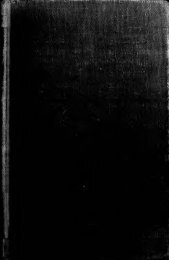Ecclesiastes - GA Barton - 1908.pdf
Ecclesiastes - GA Barton - 1908.pdf
Ecclesiastes - GA Barton - 1908.pdf
You also want an ePaper? Increase the reach of your titles
YUMPU automatically turns print PDFs into web optimized ePapers that Google loves.
CANONICITY 5<br />
peareth for a little time and then vanisheth away" (ch. 4"). Such parallels<br />
are, however, too vague to be convincing. Neither writer may<br />
have been thinking of Qoheleth at all. Haupt believes that Jesus alludes<br />
to <strong>Ecclesiastes</strong> with the purpose of combating its sentiments in the par-<br />
able of the rich man who pulled down his barns to build greater,<br />
Lk. I2 16-21 . He sees in Lk. i2 18 an allusion to Eccl. 2 4 and in i2 20b , to<br />
Eccl. 2 18b . Again, the allusions are too vague to be convincing. The<br />
view of J. Rendel Harris, that the parable is an elaboration of BS. 5 lff<br />
,<br />
is much more probable. Haupt also holds that Lk. i2 27 =Matt. 6 29 ,<br />
(Solomon in all his glory} is "above all" an allusion to <strong>Ecclesiastes</strong>, but<br />
again one must say that the likeness is not convincing. It is quite as probable<br />
that the account of Solomon in i Kings was in the mind of Jesus.<br />
Philo, like the New Testament, makes no reference to Qoheleth,<br />
but, as in the case of the .New Testament, no argument is to be<br />
drawn from this silence, as he makes no reference to a number of<br />
other books Ezekiel, Daniel, Canticles, Ruth and Lamentations.<br />
The suggestion made above, that Qoheleth was in some quarters<br />
regarded as canonical, but was not universally received, receives<br />
confirmation from one or two famous passages in the Mishna,<br />
which reached its final form about 200 A.D. In the terminology<br />
of the Mishna the way of calling a book canonical is to say that it<br />
''defiles the hands." In the Tract Yadaim, 3*, we read: "All the<br />
Holy Scriptures defile the hands. The Song of Songs and Qohe-<br />
leth defile the hands. Rabbi Judah says, 'The Song of Songs<br />
defiles the hands, but Koheleth is disputed.' Rabbi Jose says,<br />
'<br />
Qoheleth does not defile the hands, and the Song of Songs is<br />
'<br />
disputed.' Rabbi Simeon says, Qoheleth belongs to the light<br />
things of the school of Shammai, but to the weighty things of the<br />
school of Hillel.' Rabbi Simeon ben Azzai says, 'I received from<br />
the mouth of the seventy-two elders on the day when they placed<br />
Rabbi Eliezer ben Azariah in the president's chair, that the Song<br />
of Songs and Qoheleth defile the hands.' Rabbi Aqiba said, 'Far<br />
be it and peace! No man of Israel has ever doubted concerning<br />
the Song of Songs that it defiled the hands, for there is not a day<br />
in all the world like the day on which the Song of Songs was given<br />
to Israel, because all the K e tubim are holy, but the Song of Songs<br />
is most holy. And if they had doubts, they only doubted con-<br />
cerning Qoheleth. ,' Rabbi Johanan, son of Joshua,<br />
son of the





